Wednesday, October 29, 2014
Saturday, October 25, 2014
Traditional Feast of the Forty Martyrs of England and Wales
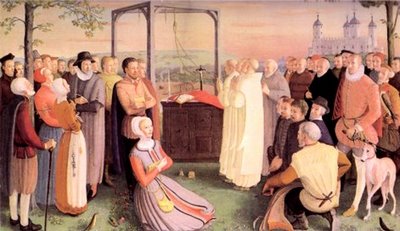
Approval of the feastday
Posted by
Catholic Conclave
at
12:00 AM
0
comments
![]()
Labels: David Lewis, Forty Martyrs, John Jones, John Lloyd, John Roberts, Philip Evans, Richard Gwyn
Monday, October 20, 2014
Our Lady of Prinknash
a statue which belonged to St Thomas More was stolen this day in 2002. It has not been returned. Please pray for its return.

Posted by
Catholic Conclave
at
12:00 AM
0
comments
![]()
Labels: 2002, Our Lady of Prinknash, Thomas More
Sunday, October 19, 2014
+ Venerable PHILIP HOWARD, Layman, 1595
Biography
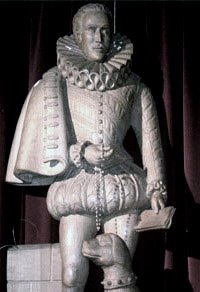
" The sufferings of this life are not worthy to be compared with the glory to come."—ROM. viii. 18.
Posted by
Catholic Conclave
at
12:00 AM
0
comments
![]()
Labels: 1595, Layman, Philip Howard
Saturday, October 18, 2014
Cardinal WILLIAM ALLEN, 1594
Biography

"They have changed my delightful portion into a desolate wilderness. They have laid it waste, and it hath mourned for me."—
JER. xii. 10, 11.
Posted by
Catholic Conclave
at
12:00 AM
0
comments
![]()
Labels: 1594, Cardinal, William Allen
Friday, October 17, 2014
Cardinal ALLEN, 1594
 "NEVER teach nor defend the lawfulness of communicating with the Protestants in their prayers, or services, or conventicles where they meet to minister their untrue sacraments ; for this is contrary to the practice of the Church and the holy fathers of all ages, who never communicated nor allowed in any Catholic person to pray together with Arians, Donatists, or what other soever. Neither is it a positive law of the Church, and therefore dispensable on occasions, but it is forbidden by God's Eternal Law, as by many evident arguments I could convince, and it hath been largely proved in sundry treatises in our own tongue, and we have practised it from the beginning of our miseries. And lest any of my brethren should distrust my judgment, or be not satisfied by the proofs adduced, or myself be beguiled therein in my own conceit, I have not only taken the opinion of learned divines here, but, to make sure, I have asked the judgment of His Holiness (Clement VIII) thereon.
"NEVER teach nor defend the lawfulness of communicating with the Protestants in their prayers, or services, or conventicles where they meet to minister their untrue sacraments ; for this is contrary to the practice of the Church and the holy fathers of all ages, who never communicated nor allowed in any Catholic person to pray together with Arians, Donatists, or what other soever. Neither is it a positive law of the Church, and therefore dispensable on occasions, but it is forbidden by God's Eternal Law, as by many evident arguments I could convince, and it hath been largely proved in sundry treatises in our own tongue, and we have practised it from the beginning of our miseries. And lest any of my brethren should distrust my judgment, or be not satisfied by the proofs adduced, or myself be beguiled therein in my own conceit, I have not only taken the opinion of learned divines here, but, to make sure, I have asked the judgment of His Holiness (Clement VIII) thereon. " And their speech spreadeth like a canker. Let every one depart from iniquity who nameth the Name of the Lord."—2 TIM. ii. 17, 20.
Posted by
Catholic Conclave
at
12:00 AM
0
comments
![]()
Labels: Cardinal, Pope Clement VIII, Protestantism, William Allen
Monday, October 13, 2014
Venerable THOMAS BULLAKER, Franciscan, 1642
Biography
"Father, glorify Thy Name. A voice came from Heaven, I have glorified it and will glorify it again."—JOHN xii. 28.
Gloria in excelsis deo,
et in terra pax hominibus bonae voluntatis
Laudamus te.
Benedicimus te.
Adoramus te.
Glorificamus te.
Gratias agimus tibi propter magnam gloriam tuam.
Domine Deus, Rex caelestis, Deus Pater omnipotens.
Domine fili unigenite, Jesu Christe.
Domine Deus, Agnus Dei, Filius patris.
Qui tollis peccata mundi, miserere nobis.
Qui tollis peccata mundi suscipe deprecationem nostram.
Qui sedes ad dexteram patris miserere nobis.
Quoniam tu solus sanctus.
Tu solus Dominus.
Tu solus Altissimus, Jesu Christe.
Cum Sancto Spiritu in gloria Dei Patris. Amen.
Glory to God in the highest,
and on earth peace to people of good will.
We praise you.
We bless you.
We adore you.
We glorify you.
We give thanks to you for your great glory.
Lord God, Heavenly King, God Almighty Father.
Lord Only-begotten Son, Jesus Christ.
Lord God, Lamb of God, Son of the Father.
You who take away the sins of the world have mercy on us.
You who take away the sins of the world hear our prayer.
You who sit at the Father's right hand, have mercy on us.
For you alone are holy.
You alone, Lord.
You alone the Most High, Jesus Christ.
With the Holy Spirit in the glory of God the Father. Amen.
Posted by
Catholic Conclave
at
12:00 AM
0
comments
![]()
Labels: 1642, Franciscan, Gloria, Thomas Bullaker
Sunday, October 12, 2014
+ Venerable THOMAS BULLAKER, OSF, 1642
Biography
"I am come to cast fire on the earth, and what will I but that it be enkindled ?"—LUKE xii. 49
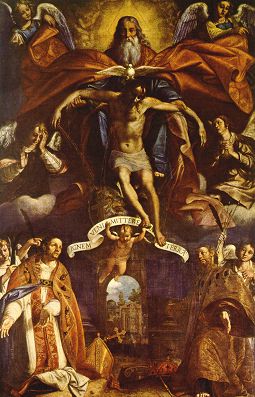
Posted by
Catholic Conclave
at
12:00 AM
0
comments
![]()
Labels: 1642, english college, Franciscan, St Omer's College, Thomas Bullaker, Tyburn
Anniversary of the Canonization of St OLIVER PLUNKETT
Biography
Posted by
Catholic Conclave
at
12:00 AM
0
comments
![]()
Labels: 1975, Armagh, Canonisation, Drogheda, Oliver Plunkett, St Patrick
Saturday, October 11, 2014
Venerable THOMAS BULLAKER, Franciscan, 1642
Biography
" Whom He foreknew, He also predestinated to be made conformable to the image of His Son."—ROM. viii. 29.
Posted by
Catholic Conclave
at
12:00 AM
0
comments
![]()
Labels: 1642, Blessed, Franciscan, Thomas Bullaker
Friday, October 10, 2014
Blessed RICHARD THIRKELD to Catholic prisoners
OUR CAPTAIN CHRIST (2)
"For it became Him who had brought many children into glory to perfect the Author of their salvation by His Passion."—HEB. ii. 10.
Posted by
Catholic Conclave
at
12:00 AM
0
comments
![]()
Labels: Blessed, Richard Thirkeld
Thursday, October 09, 2014
Blessed RICHARD THIRKELD to Catholic prisoners
OUR CAPTAIN CHRIST (1)
Biography
" But we see Jesus, who was made a little lower than the angels, for the suffering of death, crowned with glory and honour."—HEB. ii. 9.
Posted by
Catholic Conclave
at
12:00 AM
1 comments
![]()
Labels: Blessed, Richard Thirkeld
Wednesday, October 08, 2014
+ Blessed RICHARD DIBDALE, Priest, 1586
Biography (also known as Robert)
"He gave them power over unclean spirits to cast them out."—MATT. X. I.
Posted by
Catholic Conclave
at
12:00 AM
0
comments
![]()
Labels: 1586, Blessed, priest, Richard Dibdale
Tuesday, October 07, 2014
Bishop EDMUND BONNER OF LONDON, 1569
Biography

" Hath not God chosen the poor in this world, rich in faith and heirs of the kingdom which God hath promised to them that love him?"— JAS. ii. 5.
Posted by
Catholic Conclave
at
12:00 AM
0
comments
![]()
Labels: 1569, Bishop, Edmund Bonner, London
Monday, October 06, 2014
GEORGE GILBERT, Jesuit, 1583
 OF an old Suffolk family, possessed of a large fortune, a Puritan by profession, he followed in his youth the life of a gay cavalier. Going abroad, however, his eyes were opened to the faith, and he was reconciled by Father Parsons at Rome. Returning to England, he devoted himself to the services of the missionary priests, and formed for this purpose, with Lord Henry Howard, Lord Oxford, Mr. Southwell, Lord Paget, and other young men, a " Catholic Association," which was solemnly blessed by Pope Gregory XIII, on April 14, 1580. The members promised to imitate the lives of the Apostles, and to devote themselves wholly to the salvation of souls and the conversion of heretics. They were to be content with the necessaries of their state, and to bestow all the rest for the good of the Catholic cause. They supplied the priests with altar requisites, with horses, and various changes of apparel, and disguised themselves as grooms or servants and escorted the priests through the country from house to house. To Gilbert is due the first idea of the frescoes of the English martyrs in the English College, Rome. He was admitted to the Society of Jesus on his death-bed.
OF an old Suffolk family, possessed of a large fortune, a Puritan by profession, he followed in his youth the life of a gay cavalier. Going abroad, however, his eyes were opened to the faith, and he was reconciled by Father Parsons at Rome. Returning to England, he devoted himself to the services of the missionary priests, and formed for this purpose, with Lord Henry Howard, Lord Oxford, Mr. Southwell, Lord Paget, and other young men, a " Catholic Association," which was solemnly blessed by Pope Gregory XIII, on April 14, 1580. The members promised to imitate the lives of the Apostles, and to devote themselves wholly to the salvation of souls and the conversion of heretics. They were to be content with the necessaries of their state, and to bestow all the rest for the good of the Catholic cause. They supplied the priests with altar requisites, with horses, and various changes of apparel, and disguised themselves as grooms or servants and escorted the priests through the country from house to house. To Gilbert is due the first idea of the frescoes of the English martyrs in the English College, Rome. He was admitted to the Society of Jesus on his death-bed." And the multitude of believers had but one heart and one soul, neither did any one say that aught of the things he possessed was his own, but all things were common unto them."—ACTS iv. 32.
Posted by
Catholic Conclave
at
12:00 AM
0
comments
![]()
Labels: 1583, Cambridge, George Gilbert, Jesuit, Oxford, Valladolid
Sunday, October 05, 2014
Blessed WILLIAM HARTLEY, Priest, 1588
Biography
"There stood by the cross of Jesus His mother."—JOHN xix. 25.
Posted by
Catholic Conclave
at
12:00 AM
0
comments
![]()
Labels: 1588, Blessed, Cambridge, Oxford, priest, Valladolid, William Hartley
Saturday, October 04, 2014
Saint EDMUND CAMPION, Jesuit, 1581
Biography
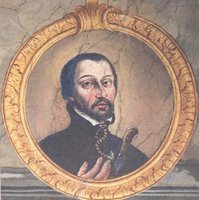
"And after this the judgment."—HEB. ix. 37.
Posted by
Catholic Conclave
at
9:49 AM
0
comments
![]()
Labels: 1581, Edmund Campion, Jesuit, saint
Friday, October 03, 2014
Venerable PHILIP POWELL, OSB, 1646
Biography
"And all that heard Him were astonished at his wisdom and answers."—LUKE ii. 47.
Posted by
Catholic Conclave
at
12:00 AM
0
comments
![]()
Labels: 1646, Benedictine, Philip Powel, Venerable
Thursday, October 02, 2014
Saint THOMAS MORE, Layman, 1535
Biography
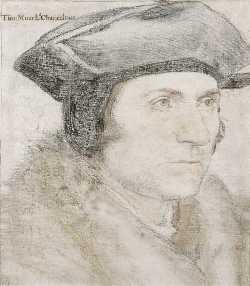
" Every kingdom divided against itself shall be made desolate, and every city or house divided against itself shall not stand."—MATT. xii. 25 .
Posted by
Catholic Conclave
at
7:29 AM
0
comments
![]()
Labels: 1535, Layman, saint, Thomas More
Wednesday, October 01, 2014
+ Blessed JOHN ROBINSON, Priest 1588
Biography
" Behold a true Israelite, in whom there is no guile."—JOHN i. 47.
Posted by
Catholic Conclave
at
12:00 AM
0
comments
![]()
Labels: 1588, Blessed, John Robinson, priest
Popular Posts
-
"With full confidence we call upon these (Our Lady, St Peter and St George) to be our pleaders before the throne of God that receiv...
-
Blessed James Bell - 1584 Blessed John Finch - 1584 Blessed Robert Nutter - 1600 Blessed Edward Thwing - 1600 Blessed Thurstan Hunt - 1...
-
THE VOICE OF THE PREACHER Biography BORN in the Diocese of Lincoln , a scholar of Corpus Christi College, Oxford, in 1546, he was mad...
-
VISITING THE PRISONER Biography WILLIAM WATSON, a secular priest, being apprehended, through force of torment went to the Protestant Church ...
-
There are about 70 beatified or canonised Catholic martyrs associated with Oxford. Five of these were killed in Oxford and their stories ...
-
THE CONTINUITY THEORY Biography OF a good Staffordshire family, and Merton College, Oxford , though he refused the oath of Supremacy ,...
-
In November 1569, Thomas Percy, 7th Earl of Northumberland, and Charles Neville, 6th and last Earl of Westmoreland, rebelled against Queen...
-
APOSTATE LAND Biography IN his defence of the Seminary Priests he wrote thus: " First and foremost for the clergy, it is wholly ...
-
"Aberdeen -- Our Lady at the Bridge of Dee, described as Our Lady at the Brig is mentioned in 1459. Near to the chapel was a...
-
The image of Our Lady Vulnerata (the Wounded One), is venerated at the Royal English College of St. Alban in Valladolid, Spain. Originall...
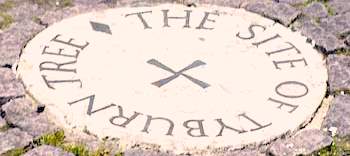
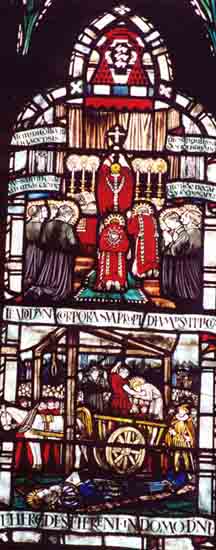
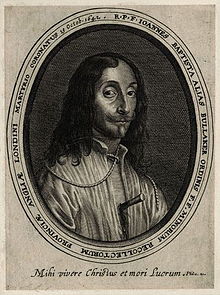



_Matthew_from_NPG.jpg)






